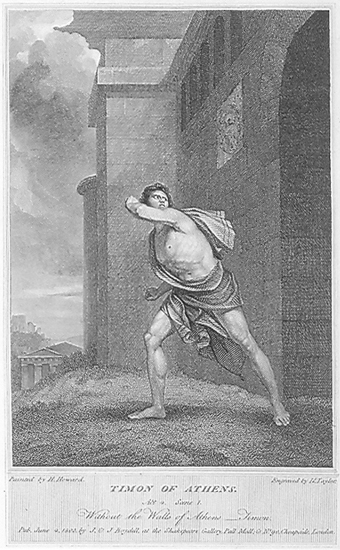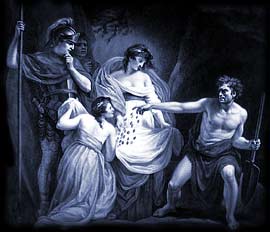Dr. Michael Delahoyde
Washington State University
TIMON OF ATHENS
|
ACT IV
SCENE i
Timon looks back on the walls of Athens and, in a lengthy and vivid curse,
prays that the whole place goes to hell. The curse includes the hope that
sons will beat out the brains of their fathers with their own crutches, and
that the whole city will contract leprosy. "Timon will to the woods, where
he shall find / Th' unkindest beast more kinder than mankind" (IV.i.35-36).
In a disturbing third-person dissociation, he asks the gods to make him a
better misanthrope . . .
And grant, as Timon grows, his hate may grow
To the whole race of mankind, high and low.
Amen.
(IV.i.39-41)
. . . but he's doing fine already.
SCENE ii
Timon's servants and Flavius lament Athens' shabby treatment of Timon.
They themselves will have to disperse.
Leak'd is our bark,
And we, poor mates, stand on the dying deck,
Hearing the surges threat; we must all part
Into this sea of air.
(IV.ii.19-22)
Flavius shares what money he has left with them and, like Kent for Lear
(Garber 642), insists he'll always remain loyal to Timon as steward.
Flavius soliloquizes: "Who would not wish to be from wealth exempt, /
Since riches point to misery and contempt" (IV.ii.31-32). He ends the
scene saying to himself, "I'll ever serve his mind with my best will;
/ Whilst I have gold, I'll be his steward still" (IV.ii.49-50). The
elder Ogburns suggest a parallel in Thomas Churchyard for Oxford
(Ogburn and Ogburn 122).
|

|
SCENE iii
Timon takes up life as a misanthropic hermit, railing at injustice and
arbitrariness. "It is the paster [pasture] lards the rother's [ox's]
sides, / The want that makes him lean" (IV.iii.12-13). When he digs for
roots to eat, he discovers a treasure of gold coins: "if it is his mere
reversal of worldly estate that has precipitated Timon's misanthropy,
with the restoration of riches he may be expected to revert to his former
frame of mind. But Timon is no fool of time" (Goddard, II 177).
He ironically vows to put it to proper use, "to prove the universal
corruptibility of man" (Goddard, II 177). Timon re-buries most
of it, but keeps some gold out: "thou't go, strong thief, / When gouty
keepers of thee cannot stand" (IV.iii.46-47).
Timon is unique as a character in that he has no relations, no family
connections (Bloom 589). When Shakespeare uses the term "root" he
usually is referring to history or family (Garber 645).

|
Alcibiades comes by with two women and Timon curses him for exposing him
to examples of humanity. Alcibiades at first doesn't recognize Timon, who
calls himself Misanthropos now. But when he does realize it's Timon, he
asks how he became so changed. "As the moon does, by wanting light to give:
/ But then renew I could not, like the moon; / There were no suns to borrow
of" (IV.iii.68-70). Alcibiades asks what he can do for Timon, but Timon just
continues cursing. Alcibiades asks the women to be forgiving, "for his wits
/ Are drown'd and lost in his calamities" (IV.iii.89-90). Although giving
Alcibiades gold to wage war on Athens, Timon wants him to become a butcher:
"Let not thy sword skip one. / Pity not honor'd age for his white beard,
/ He is a usurer" (IV.iii.111-113). [An allusion to Burghley (Ogburn and
Ogburn 119)?] Alcibiades should slay young women and children too. Timon
also gives the women money to continue their profession as prostitutes
since it can, through v.d., cause more damage than can Alcibiades and an
entire army. He tells them to wear wigs and make-up: "thatch your poor thin
roofs / With burthens of the dead -- some that were hang'd, / No matter;
wear them, betray with them. Whore still, / Paint till a horse may mire
upon thy face: / A pox of wrinkles" (IV.iii.145-149). Alcibiades hopes
to visit Timon again, but he realizes their presence now is only upsetting
him.
|
The name Phrynia comes from Phryne, a wealthy prostitute whose clients
were prominent men during the time of Alexander the Great a century later
than the events of this play. The historical Alcibiades was banished for
suggesting a military plan that another incompetent general bungled and
for suspected vandalism of religious statues. A known agnostic, he was
probably framed (Asimov 140-141). He fled to Sparta and for a while
served as a military advisor, indeed against his home city of Athens.
After Timon prays that earth invest itself in the creation not of men
but of beasts and monsters -- such as the "venom'd worm" (IV.iii.182)
-- Apemantus next visits, reporting that the flatterers continue living
it up "and have forgot / That ever Timon was" (IV.iii.207-208) -- that
E.Ver Timon was? Apemantus claims to have heard that Timon now subscribes
to his cynical philosophy: "Do not assume my likeness" (IV.iii.218). But
he also admits he's come to vex Timon (IV.iii.236). It seems to be a
battle for whose misanthropy is more authentic. Timon avers,
Hadst thou, like us from our first swath, proceeded
The sweet degrees that this brief world affords
To such as may the passive drudges of it
Freely command, thou wouldst have plunged thyself
In general riot....
Thy nature did commence in sufferance, time
Hath made thee hard in 't.
(IV.iii.252-269)
Some vocabulary of Cambridge education is woven into this [Derran
Charlton, "Cambridge University 'Implications.'" Shakespeare Oxford
Newsletter 44.2 (Spring 2008): 6]. Apemantus assesses Timon thus:
The middle of humanity thou never knewest, but the extremity of both
ends. When thou wast in thy gilt and thy perfume, they mock'd thee for
too much curiosity; in thy rags thou know'st none, but art despis'd
for the contrary.... And th'hadst hated meddlers sooner, thou shouldst
have lov'd thyself better now. (IV.iii.300-310)
The initial description sounds like Oxford back from Italy (Ogburn and
Ogburn 124). The medlar/meddler comment hints of Burghley.
The discussion grows hostile, with Timon the clear winner in an exchange
of insults: "Would thou wert clean enough to spit upon!" "I'll beat thee,
but I should infect my hands" (IV.iii.359, 364). This devolves further,
from invective to stone-throwing: "I am sorry I shall lose a stone by
thee" (IV.iii.370).
"The omnipresence of dog imagery and dog language in the play" evokes
the grisliness of "carnivorous destruction" (Garber 642). But Timon
"is pure mouth-piece, even when his poetry is best" (Van Doren 252).
Timon, "sick of this false world," plans to prepare his own grave
(IV.iii.375-380).
Three bandits enter, having heard of Timon's gold. Timon baffles them
by giving them invective and gold, encouraging them in their thievery.
The sun's a thief, and with his great attraction
Robs the vast sea; the moon's an arrant thief,
And her pale fire she snatches from the sun;
The sea's a thief, whose liquid surge resolves
The moon into salt tears; the earth's a thief,
That feeds and breeds by a composture stol'n
From gen'ral excrement; each thing's a thief.
(IV.iii.436-442)
A grim "chain of being"! This passage seems related to some of what
Pythagoras says in Book 15 of Ovid's Metamorphoses (Ogburn and
Ogburn 125; cf. IV.iii.344-345). The thieves resolve to return to
Athens where they will simply be robbing from other thieves. The gold,
then, is a "naked ... piece of poetic property" used to express love
early in the play and hatred now (Van Doren 251). Through all the
railing and nastiness, paradoxically, "Deep down, Timon is no
doctrinaire but a lover of the truth" (Goddard, II 178).
Flavius visits Timon and mourns his fallen state. Timon orders him
away, but Flavius swears he is a true servant and Timon is moved by
his sincerity and weeping and declares him the "One honest man"
(IV.iii.497). Timon gives him gold so that he can live apart from
other humans (IV.iii.525-526). Flavius would stay with Timon, but
Timon insists on remaining alone.
Act V
Shakespeare Index

